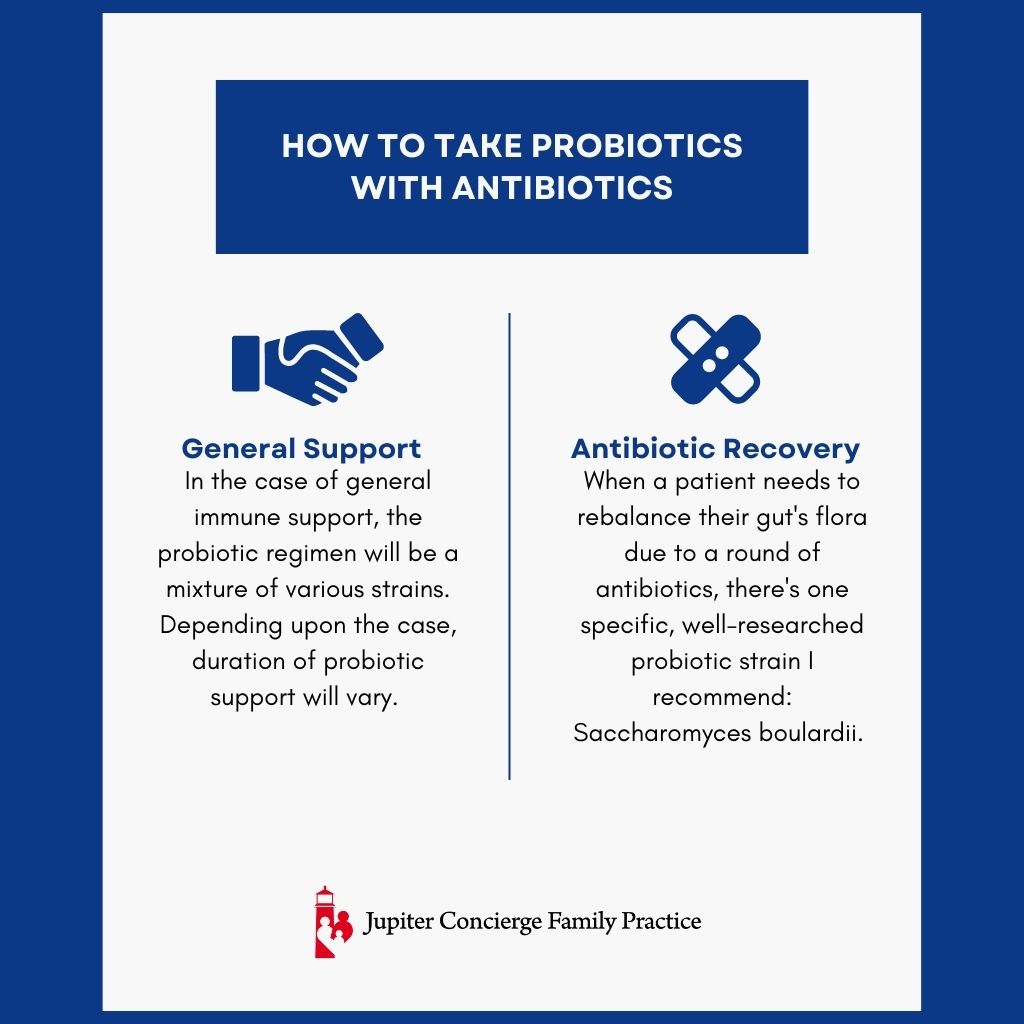
Most people divide health into varying degrees of good and bad. Met this month’s exercise goal? Good! Pulled a hamstring? Bad! More leafy greens? Good! Bacteria in your gut? Bad? Wait, no, also good!
Though it may seem counter-intuitive, not all bacteria are bad. In fact, far from being bad, the presence of bacteria is crucial to human health. We all have important bacterial ecosystems — also called microbiomes — inside our bodies that are necessary for appropriate functioning.
Many people are aware that we need to protect and preserve our beneficial gut bacteria, and they know probiotics can help. In order to be good stewards of their microbiomes, they ask, “Can you take probiotics with antibiotics?”
First, you certainly can!
Second, I think another question to ask is, “Should you take probiotics with antibiotics?”
And the answer is, absolutely.
Here’s a healthy dose of information on bacteria, antibiotics, and probiotics, and how they all interact with one another.
Bacteria: Harmful and Helpful
In practical terms, an intact bacterial microbiome, especially in the gut, is part of the body’s natural defense mechanism. We need these benevolent bacteria. For example, they help us digest food and absorb nutrients. They help our immune systems flourish. These bacteria are “good” and helpful; they are essential components of optimal health.
Sometimes, though, bacteria does deserve its bad reputation. Potentially harmful bacteria doesn’t always make us sick. It can live inside our body without leading to an active infection, perhaps kept in check by some of our resident good bacteria. Other times, it gets introduced into the body from an outside source, such as spoiled food, poor hygiene, getting sneezed on by someone with a bacterial infection, or having a cut that gets infected.
When harmful bacteria proliferate, they create imbalance, and that imbalance results in a disease process. In other words, you get sick!
Bacterial infections often lead to physicians prescribing antibiotics. Antibiotics kill off the infection-causing bacteria, and can be life-saving. Bacterial infections such as pneumonia and urinary tract infections can become life-threatening without antibiotics. In fact, since antibiotics came along in the early 1900s, they’ve increased our life expectancy significantly, saving countless lives.
You may have noticed physicians prescribe antibiotics in certain instances and not in others. It’s important to note that not all sicknesses are caused by bacteria. Antibiotics can’t kill viruses, which is why physicians differentiate between bacterial infections and viral infections.
Viral infections — like the common cold, a run-of-the-mill upper respiratory infection, and COVID-19 — are caused by viruses, not bacteria. While antibiotics kill bacteria, they are ineffective — and can even be harmful — if used in viral conditions. Because bacterial and viral infections can look similar, a diagnosis from a physician is always necessary before you take antibiotics.
Antibiotics are great at killing off harmful bacterial infections, but they can have unintended consequences. Cutting-edge science is at work developing more targeted antibiotics, but by and large antibiotics still can’t choose which bacteria they kill.
Their job is to wipe out bacteria, and they do it well. The trouble is, they kill both the harmful bacteria and the helpful bacteria.
That’s why a person on antibiotics needs extra support to reclaim full health. That’s why you need probiotics.
When To Take Probiotics With Antibiotics
The microbiome — or normal flora — of your gut is crucial to the functioning of your immune system. In fact, about 60–70% of your immune system resides in your intestines. And that microbiome is healthy when it’s in balance.
When antibiotics come in and kill the harmful bacteria AND the helpful bacteria, the balance of the microbiome is disrupted. One of the most common consequences of this disturbance is an overgrowth of certain bacteria, an infection that leads to diarrhea. If left untreated, antibiotic-associated infections with diarrhea can become very serious.
This is why you should take probiotics when you’re taking antibiotics. They help prevent the normal flora of your gut from getting so out of balance that an infection results.
Composed of helpful bacteria that recolonize your microbiome, probiotics are the antidote to the bacterial imbalance caused by antibiotics. Taken in capsule or liquid form, probiotics reestablish equilibrium in the intestinal flora and help the immune system work at its optimum.
How To Take Probiotics With Antibiotics
I recommend probiotics to my patients for one of two reasons:
- General support. In the case of general immune support, the probiotic regimen will be a mixture of various strains. Depending on the case, the duration of probiotic support will vary.
- Antibiotic recovery. When a patient needs to rebalance their gut’s flora due to a round of antibiotics, there’s one specific, well-researched probiotic strain I recommend.The name doesn’t exactly roll off the tongue, but it’s worth knowing. Saccharomyces boulardii, a type of yeast, is the most evidenced-based probiotic in medical literature when it comes to restoring helpful bacteria in the gut.In most cases, patients take this probiotic twice daily while on their antibiotic. Once the round of antibiotics ends, I recommend continuing the probiotic dosage for about two more weeks. However, you should always speak with your own physician before implementing any new health strategy and to determine particular dosages.
Probiotics are easy to use, take, and store. I recommend refrigerating any probiotic, including Saccharomyces boulardii, if you don’t use it within one month.
Conclusion
When we understand the relationship between harmful and helpful bacteria, we can see how important preserving helpful bacteria is to vibrant health. Probiotic use is a simple, evidence-based way to reestablish microbiome balance and aid in optimum immune system functioning.

Dr. David Rosenberg
Dr. Rosenberg is a board-certified Family Physician who obtained a BS in Chemistry at Georgia's Mercer University in 1983 and a medical degree from the University of Miami in 1988. He completed his residency in Family Medicine at The Washington Hospital in Washington, Pennsylvania, in 1991 and then practiced Emergency Medicine at Palm Beach Gardens Medical Center for two years. In 1993 he started private practice in Jupiter.
Dr. Rosenberg has been married to his wife Mary for 38 years and they have three grown children together. Some of his interests include being a huge baseball fan, sailing, snow skiing, self-development, and learning to play piano.

